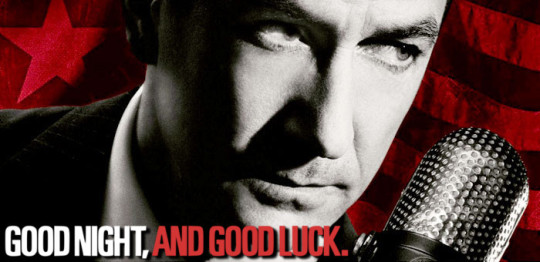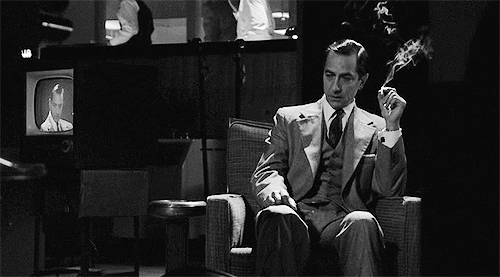#maragret aloi
Text
Good Night, And Good Luck Review (2005)

There has been a lot of great movies out there that have depicted on historical events pertaining to how society was like in the 20th century. Films like: Schindler’s List (1993), Apocalypse Now (1979), and Apollo 13 (1995), were all pretty good film adaptations on what was exactly happening during those specific time periods; coming from only a director’s interpretation towards his or her’s creative abilities. George Clooney’s 2005 film, “Good Night, And Good Luck,” turned out to have been another triumphant motion picture about television’s political activism on U.S. Senator Joseph McCarthy during the 1950s. The reception of this movie received a total of six academy awards, in which some of those included for best actor, best director, and best picture!! Nevertheless, this movie did extremely well in the box office, as I’m still quite blown away George Clooney was able to pull off such a controversial issue on governmental politics during the McCarthy hearings in the 1950s. This blog post will cover a synopsis of the film, so without further adieu, let’s get started!!
The film starts up in a 1958 press conference involving the departure of CBS newscaster Edward R. Murrow; played by David Strathairn. During Murrow’s final speech, he stated that people must use television as a form of educational opportunities, rather than it being just an entertainment gimmick of lights on a box with vast amounts of moving images. We are then transported back a few years to CBS Television Studios in 1953, when Murrow and his fellow team of reporters learn about a U.S. Air Force officer being discharged because of him being presumed and labeled as a communist. Murrow quickly springs into action, as he presents this story to Sig Mickelson; the director of CBS News (Jeff Daniels). He warns Murrow afterwards, addressing that this story could be a potential risk to CBS’ sponsors; whom some of which were containing governmental contracts. Murrow refused to prevent this from happening, as he and his team decided to air the story on live national television. For more insight, here’s a short clip of Murrow’s news broadcast on the event:
youtube
After Murrow’s news segment went on the air, the public really supported its cause for only a short time. Joseph Wershba (Robert Downey, Jr.), an editor for CBS, acquired an envelope describing false accusations of Murrow being a communist threat to the U.S. government, which later brought an unsettling tension onto CBS’ chief executive, William Paley (Frank Langella). Paley persuades Marrow that who ever is associated with communism will be stepped down for his next story...the attack of Senator Joseph McCarthy. Throughout the remainder of the film, Murrow continued to expose McCarthy for his accusations, as they were all deemed effective for the most part. Later, McCarthy then goes on Murrow’s show for which he allows to have him featured on the program. This continued to spread a whole mess of problems between Murrow and his team of reporters shortly after. Here’s a clip of Murrow’s broadcast with Joseph McCarthy (FYI: it’s kind of long, so skip to the good parts if necessary):
youtube
A few days later, the U.S. senate was in the process of investigating McCarthy, as Murrow’s broadcast soon began to end his tirade of public indecency. Murrow and his team were out celebrating the good news, but it was once again cut short to say the least. Don Hollenbeck (Ray Wise), Murrow’s fellow colleague, was facing a slew of problems during Murrow’s attack on McCarthy. His wife recently divorced him while a publicist named Jack O’Brian, accused Hollenbeck of being a “pinko” during his news speeches. These outcomes lead to his demise as he committed suicide from Carbon Monoxide poisoning in his home. Not only did Murrow lose a loyal friend, but his program was then cut in duration because of high production costs and overly controversial topics. This eventually brings us back full circle to the 1958 press conference, as Murrow gave his final speech to the press. Here’s a clip of Murrow’s 1958 press conference:
youtube
Well, that was most of what I got out of George Clooney’s 2005 motion picture, “Good Night, And Good Luck.” This movie was such a surreal experience by informing all of us on how television wasn’t used for just entertainment, but for educational purposes based on controversial events while it was still in its infancy. Edward R. Murrow’s goal was to treat television as a 24-hour news phenomenon, much like of what CNN is doing right now. By the early 1960s, television became more than just news, as we were all trying to find new ways of expanding this new medium for further monetary gain. Still, I’ll agree with Murrow...the future of television is whatever you make it, but without people being educated, how can one determine its future? I guess in 1958, we were all uncertain on what it could do for us, as his last words were: “Otherwise it’s merely wires and lights in a box...good night and good luck.”

-AndyM
#good night and good luck#movie#2005#george clooney#david strathairn#robert downey jr#frank langella#jeff daniels#ray wise#patricia clarkson#joseph mccarthy#mccarthyism#1950s#1953#1958#film#adaptation#digital culture#fall 2017#maragret aloi#suny new paltz#new paltz#new york#ny#college#university
4 notes
·
View notes